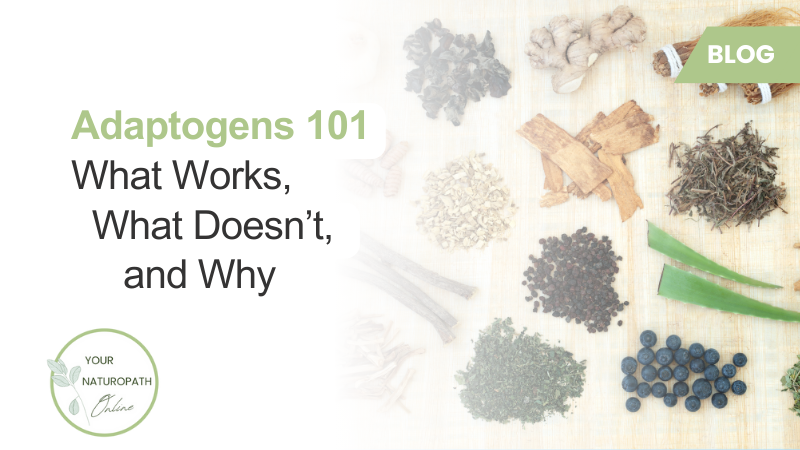Naturally Fresh: Apple Cider Vinegar as Your Deodorant Secret
- Tanya Kurzbock

- Nov 4, 2023
- 4 min read
Updated: Dec 10, 2024
When it comes to personal care, we're often bombarded with a plethora of products designed to keep us smelling fresh and clean. Deodorants and antiperspirants line the store shelves, each claiming to be the ultimate solution to combat body odor - but they are loaded with chemical agents that drive hormonal imbalance, add to our toxic load, and even upset our immune system driving T-Helper 2 dominant states. Luckily there is a safe all-natural secret to stay odor-free: apple cider vinegar (ACV). Not only can it neutralise unpleasant scents, but it can also help kill bacteria and yeast, making it a compelling alternative to commercial deodorants.

The Problem with Traditional Deodorants
Commercial deodorants and antiperspirants typically contain a cocktail of chemicals, including aluminum compounds, parabens, and synthetic fragrances. While these products might keep you dry and odor-free, their long-term effects on your health have raised concerns. Aluminum, for example, can block sweat glands, potentially disrupting your body's natural cooling mechanism and leading to a build-up of toxins. Additionally, some of the chemicals used in these products have been associated with skin irritation, allergies, and even hormonal imbalances.
Chemicals to Avoid in Deodorants and Antiperspirants
Aluminum Compounds
Aluminum-based compounds, such as aluminum chlorohydrate and aluminum zirconium, are commonly used in antiperspirants to block sweat glands and reduce sweating. Some studies have suggested a potential link between aluminum exposure and breast cancer, Alzheimer's disease, autoimmune disease, and increased risk for patients with kidney disease.
Parabens
Parabens (such as methylparaben, ethylparaben, and propylparaben) are preservatives used in many personal care products, including antiperspirants. Concerns have been raised about their ability to mimic estrogen, disrupt the endocrine system, drive estrogen dominance, impact fertility, and generally play havoc with our hormones.
Fragrances
Fragrances are commonly used in antiperspirants to mask odor. Some fragrance ingredients may be allergenic or irritating to the skin, and manufacturers are not required to disclose the specific chemicals used in their fragrance blends. The term "fragrance" on product labels often conceals a complex mixture of multiple chemical compounds that have been associated with skin irritation, allergies, and other health issues.
Triclosan
Triclosan is an antimicrobial agent used in some antiperspirants. It has been associated with concerns regarding antibiotic resistance and potential environmental impact. In 2016, the FDA banned the use of triclosan in over-the-counter antibacterial soap products, but it is still used in some antiperspirants.
Phthalates
Phthalates are a group of chemicals used to improve the flexibility and durability of plastics, including packaging. They are sometimes found in fragrances used in antiperspirants and other personal care products. Some phthalates have been linked to endocrine disruption and potential reproductive and developmental effects.
Talc
Talc is used in some antiperspirants as an absorbent and anti-caking agent. Controversies have arisen regarding the potential contamination of talc with asbestos, a known carcinogen. However, cosmetic-grade talc is required to be asbestos-free.
If you have concerns about any of these ingredients (and you should!), you can explore alternative products, such as natural and aluminum-free deodorants, which are formulated without some of the ingredients mentioned above. Always read product labels and consult with a healthcare professional if you have specific health concerns or sensitivities.
Apple Cider Vinegar: Nature's Deodorant

Apple cider vinegar, derived from fermented apple juice, is a versatile and natural remedy for various health and beauty needs. When it comes to using ACV as a deodorant, it offers some pretty cool benefits:
Balancing pH: The slightly acidic nature of ACV helps maintain the skin's pH balance. An imbalanced pH can create an environment where odor-causing bacteria and yeast thrive. By restoring the skin's pH, ACV discourages the growth of these odor-causing microorganisms.
Bacteria and Yeast Control: ACV's antimicrobial properties are well-documented. It can help eliminate bacteria and yeast responsible for unpleasant odors. These microorganisms feed on sweat and release odorous byproducts, but ACV can disrupt their activities.
Odor Neutralisation: ACV can help neutralise odors without the need for artificial fragrances. It breaks down the compounds responsible for bad smells, leaving you feeling naturally fresh.
How to Use Apple Cider Vinegar as Deodorant
Using ACV as a deodorant is simple and cost-effective:
1. Dilute It: Mix one part ACV with one part water. This dilution helps prevent skin irritation and ensures the vinegar doesn't feel too harsh.
2. Application: Apply the diluted ACV to your underarms using a cotton ball or a reusable cloth. Let it dry before dressing to avoid any vinegar scent.
3. Adjust to Your Needs: You can adjust the vinegar-to-water ratio to suit your sensitivity and preferences. Some people may prefer a stronger or milder solution.
Tips for Success
- Perform a patch test to ensure you don't have an adverse reaction to ACV.
- Allow your underarms to air dry completely after application.
- If you're concerned about the initial vinegar scent, it typically fades as it dries.
- Be consistent with your ACV deodorant application for maximum results.
Apple cider vinegar as a deodorant is a natural and eco-friendly alternative to traditional options. It helps maintain a healthy balance of bacteria and yeast on your skin while keeping you odor-free. Give it a try, and you may just discover the secret to naturally fresh and confident underarms.

Writen by naturopath Tanya Kurzbock
Founder of YourNaturopath.Online
Check out upcoming events - CLICK HERE
Book a free Discovery Call with Tanya - CLICK HERE









Comments